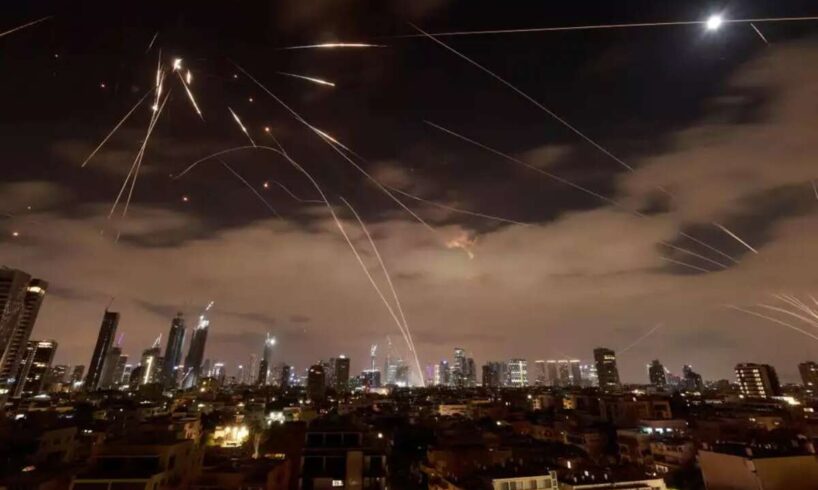
After the 12-day war between Israel and Iran, many in Israel came away with the impression that Israel had “won.” Iran was hit, hard, and Israeli achievements left Tehran no longer considered a threshold nuclear state.
But in Iran too, a narrative of “victory” has taken root. While no one in Tehran denies that Israel scored major achievements, officials there point to the regime’s survival and rapid recovery, replacing assassinated senior figures within 24 hours, as proof of resilience. From their perspective, simply holding their own against Israel and the US in a direct confrontation was itself a dramatic accomplishment.
Damage in Iran. Photo: AFP AFP
Do not dismiss Iran’s sense of victory
That sense of victory should not be underestimated. With the nuclear negotiations at a dead end, further complicated by the E3 decision to trigger the “snapback” mechanism and restore all sanctions lifted in 2015, Iran appears less fearful of another war. Its leaders believe they can achieve gains that eluded them in the last round.
Tehran still prefers a diplomatic path that could lead to sanctions relief. But given the Western stance, which Iran views as a “demand for surrender,” its leadership recognizes that military escalation is increasingly likely. This is especially true in light of repeated Israeli warnings of renewed strikes if Iran attempts to rebuild its capabilities, particularly in the nuclear field.
Learning from its mistakes, Iran is now focused on upgrading its missile arsenal and fortifying its defenses. Reports of missile tests and boasts by senior officials about new systems are issued almost daily. At the same time, Iranian leaders declare they will not hesitate to launch a preemptive strike if they believe Israel is about to attack. They are also courting Moscow and Beijing for advanced air-defense systems to replace the ones that collapsed during the last conflict.
Missile launch by Iran’s Revolutionary Guard (archive photo). Photo: EPA EPA
Iranian readiness, American support
In Operation With a Lion’s Heart, Israel enjoyed the advantage of total surprise and deployed cutting-edge capabilities that inflicted heavy blows on the ayatollahs’ regime, all under a US security umbrella that included unprecedented military support. Washington even deployed $800 million worth of THAAD missile interceptors to protect Israel.
Israel is unlikely to enjoy such ideal conditions in the next round. Whether Iran strikes first out of miscalculation or Israel launches another attack, Iran’s readiness will be on a different level. At the same time, with President Donald Trump increasingly preoccupied with other crises, from Venezuela to Russia’s invasion of Ukraine, it is unclear how much US backing Israel will receive in another war.
The combination of Iranian preparedness and doubts about American involvement could leave Israel facing challenges far greater than in the previous round. If Washington is less committed this time, questions will arise about how a future conflict could be brought to an end, and how to avoid sliding into a prolonged war of attrition that could exact a heavier toll on Israel than on Iran, given Iran’s geographic depth and its experience from the devastating 1980-88 war with Iraq.
Above all looms the question of purpose, of what would the next war actually achieve, especially given the growing consensus that air campaigns alone cannot topple the regime in Tehran.
Fire in Iran after an Israeli strike. Photo: Arab Networks
Tensions at a peak
If the recent war taught Israel anything, it is that the Iranian regime is more resilient than it appears. There are no “moderates waiting in line” to replace Supreme Leader Ayatollah Ali Khamenei, even if Israel were to eliminate him.
On the nuclear front, it is doubtful that another campaign could do lasting damage to Iran’s enrichment facilities. Such a war would not erase the knowledge possessed by Iranian scientists, nor the nuclear materials already stockpiled, leaving the Islamic Republic capable of working toward a bomb, if it so chooses.
A supporter of government waves an Iranian flag as he takes part a protest against opposition demonstration during holy day of Ashura in Tehran December, 30 2009 | Photo: Reuters / Morteza Nikoubazl Reuters / Morteza Nikoubazl
And if the next war begins where the last one ended, the initial stages will almost certainly be more violent. Iran would likely deploy capabilities aimed at inflicting significant damage on Israel’s home front, right from the outset.
The collapse of diplomacy, Tehran’s determination to restore its nuclear program, and Israel’s declared readiness for another attack have pushed tensions to the highest point yet. The risk of escalation is real, and this time Iran may be better prepared than before.
Even if Israel maintains its military superiority, particularly in the air, the question remains: What would be the real purpose of a war whose chances of spiraling out of control are higher than ever?





